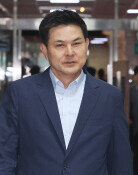Cyber education era
Students of cyber universities oppose the move by politicians to halve tuition at brick-and-mortar schools, saying supporting students from high-income families with taxpayers` money is irrational. About 70 percent of 250,000 students enrolled at 20 online universities across Korea have jobs. Many of them work and study at the same time after giving up going to university because of financial problems. Many students who have a university diploma are also getting more education to adapt to the rapidly changing job market.
It is natural that cyber students studying to meet their needs consider it unfair to use tax money they pay from their hard earned income to provide support for offline students rich or poor. Politicians who are vying to pour tax money into halving university tuition under a populist approach should pay attention to this argument.
"Though halving university tuition has become a matter of urgent interest, a bigger challenge we face is a fundamental shift in the paradigm of university education," said Kim Choong-soon, president of the Cyber University of Korea. The more mature the knowledge-based society of the 21st century becomes, higher education will likely evolve into offline education amalgamated with IT. The venue of learning has gone beyond lecture halls to cyberspace. Kim warns that within a decade, universities bent on receiving hefty tuition and putting up campus buildings while turning a blind eye to this paradigm shift could become "relics" with only ghostly buildings left.
Cyber universities are institutions of higher education that most quickly adapt to the paradigm shift of the IT era. Students choose only the courses they need and pay tuition in proportion to the number of courses selected, making it impossible for substandard lecturers to be hired. Online universities charge just about a fourth of tuition at offline schools. As Korean society ages, an increasing number of people take occupational courses offered by cyber universities to seek new careers. Silver industry courses offered by Hanyang Cyber University and Digital Seoul Culture Arts University and dining courses at Kyung Hee Cyber University and Sejong Cyber University are popular. The Cyber University of Korea has launched elderly care and nursing courses under a partnership with the U.S. Rosalynn Carter Institute for Caregiving.
At a time when IT development and spreading globalization are causing a paradigm shift in education, cyber universities are a viable alternative for higher education in the future. Government assistance to universities should be focused on future vision. Politicians indifferent to the future of education and who care only about policies to help them win votes should reflect on their behavior.







